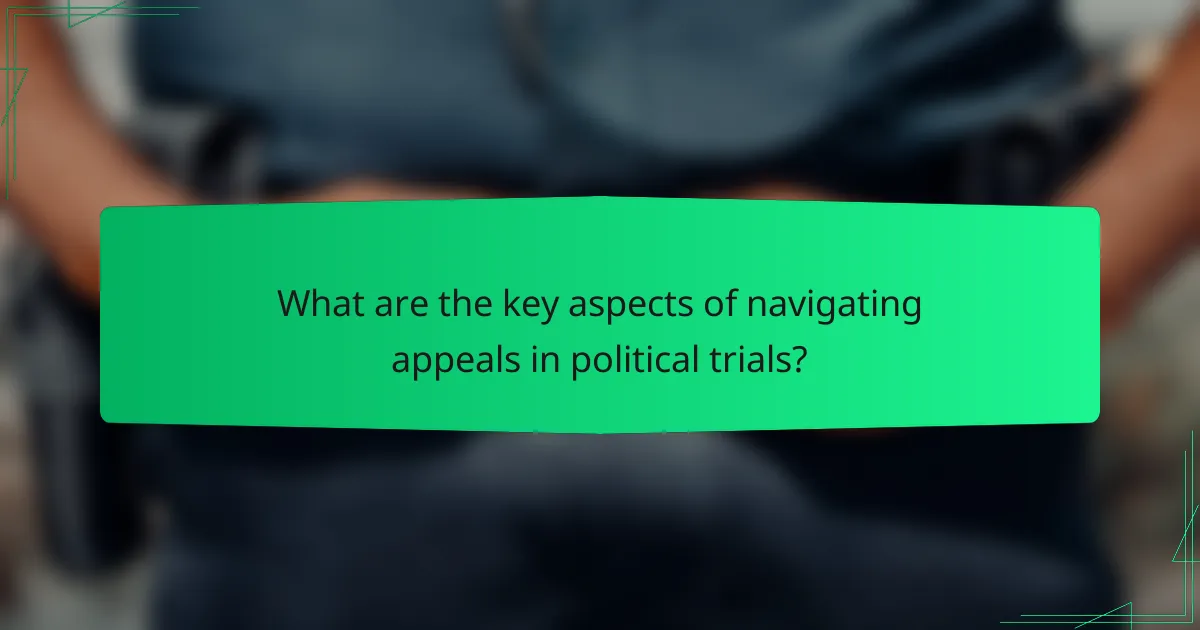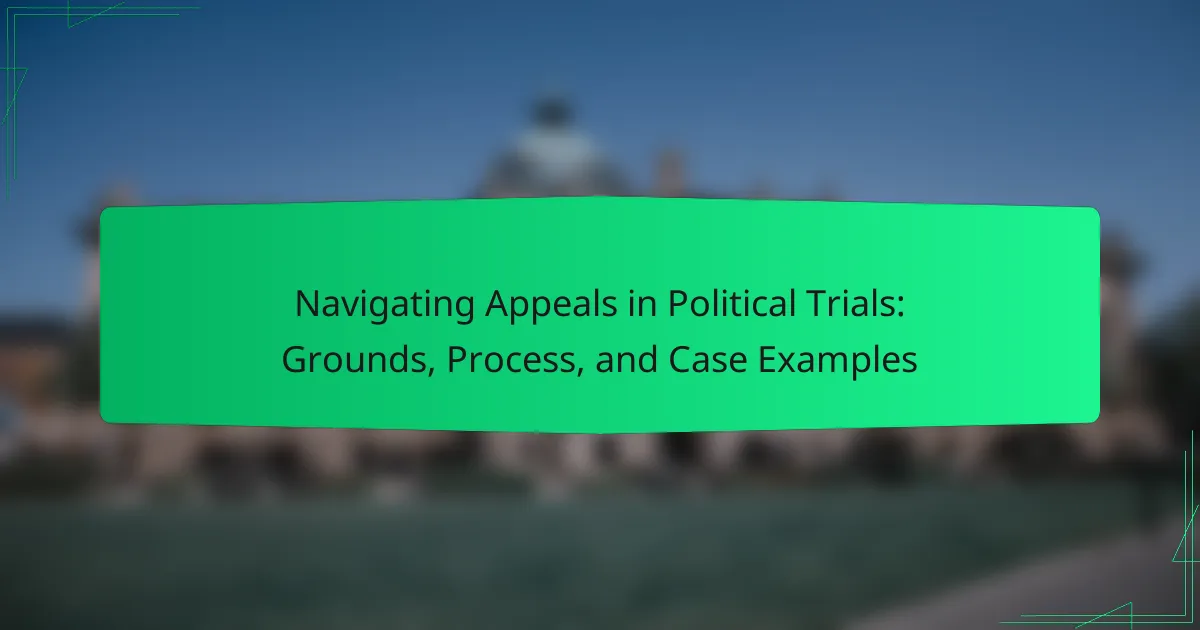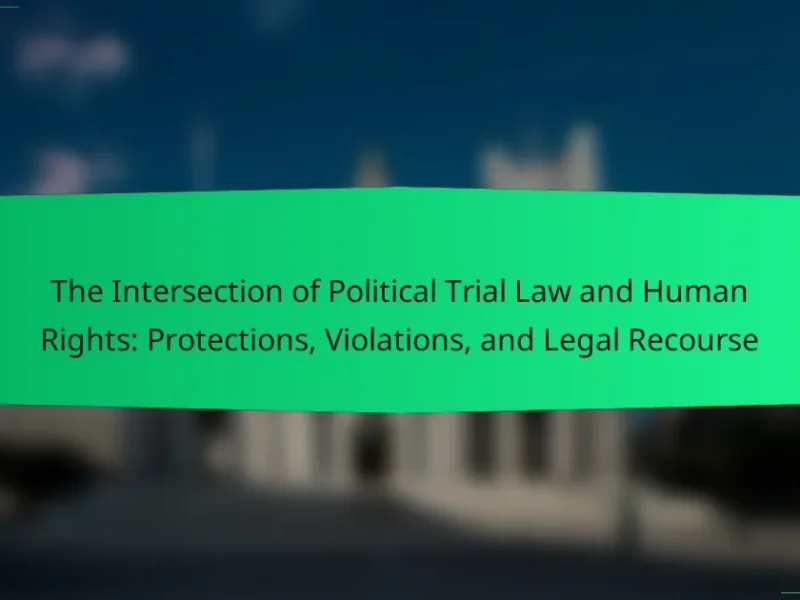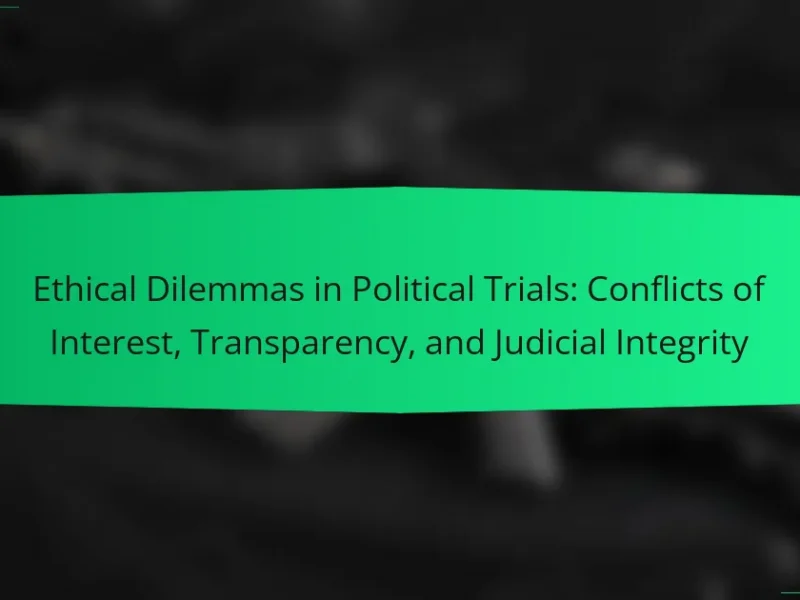Navigating appeals in political trials involves understanding key legal concepts, including legal grounds for appeal, procedural rules, and strategic considerations. Legal grounds typically focus on errors in law or procedure that occurred during the trial, while procedural rules outline the necessary steps and timelines for filing appeals. Strategic considerations assess the likelihood of success and any political ramifications that may arise. Thorough documentation and legal arguments are essential to highlight trial errors, and experienced legal counsel is crucial for effectively managing the complexities of political trial appeals. Historical case examples, such as the appeals related to the Watergate scandal, illustrate the intricate nature of these proceedings.

What are the key aspects of navigating appeals in political trials?
Key aspects of navigating appeals in political trials include understanding legal grounds, procedural rules, and strategic considerations. Legal grounds for appeal often involve errors in law or procedure during the trial. Procedural rules dictate how appeals must be filed and the timeline for doing so. Strategic considerations include evaluating the likelihood of success and potential political implications. Appeals may also require thorough documentation and legal arguments that highlight trial errors. Successful navigation of appeals often relies on experienced legal counsel familiar with political trial nuances. Historical examples, such as the appeals in the Watergate scandal, demonstrate the complexities involved in such cases.
How do political trials differ from regular trials?
Political trials differ from regular trials primarily in their context and motivations. Political trials often involve cases against individuals for actions related to their political beliefs or activities. These trials can be influenced by governmental or political pressures, impacting the fairness of the proceedings. Regular trials typically focus on criminal or civil matters without political implications.
In political trials, the accused may face charges that reflect a government’s agenda rather than objective legal standards. For example, political figures in authoritarian regimes may face charges to silence dissent. This contrasts with regular trials, where legal outcomes are based on established laws and evidence.
Additionally, political trials may lack transparency and impartiality. Regular trials usually adhere to established judicial procedures and protections for defendants. Historical examples, such as the trials during the Stalinist purges, illustrate how political motives can distort judicial processes.
What unique challenges arise in political trials?
Political trials face unique challenges due to their inherent complexities. These challenges include heightened public scrutiny, which can influence jury impartiality. Political motivations often complicate legal interpretations, leading to controversial rulings. The involvement of high-profile figures can create media bias, impacting the trial’s perception. Additionally, legal frameworks may lack clarity in politically charged cases, resulting in ambiguous outcomes. Historical precedents, such as the Nuremberg Trials, illustrate the difficulties of ensuring fair legal processes in political contexts. These factors collectively contribute to the distinct nature of political trials.
How does the political context influence trial outcomes?
The political context significantly influences trial outcomes by shaping judicial decisions and public perception. Political pressures can affect the impartiality of judges and juries. For example, high-profile cases often attract media attention, which can sway public opinion and impact trial dynamics. Additionally, government policies and political affiliations may influence the prosecution’s approach. In some instances, political motives can lead to biased rulings or selective enforcement of laws. Historical examples include politically charged trials during authoritarian regimes, where outcomes were predetermined to serve political ends. Thus, the interplay between politics and law can create an environment where justice is compromised.
What are the common grounds for appeal in political trials?
Common grounds for appeal in political trials include procedural errors, insufficient evidence, and violations of constitutional rights. Procedural errors can involve mistakes made during the trial process, such as improper jury instructions. Insufficient evidence refers to a lack of credible proof to support the conviction. Violations of constitutional rights often encompass issues like the right to a fair trial or due process. Each of these grounds can significantly impact the outcome of an appeal. Historical cases have demonstrated the importance of these grounds in achieving justice. For instance, appeals based on procedural errors have led to retrials in several high-profile political cases.
What legal standards must be met for an appeal to be valid?
An appeal must meet specific legal standards to be considered valid. Firstly, the appellant must demonstrate standing, meaning they must have been directly affected by the trial court’s decision. Secondly, the appeal must be filed within a set timeframe, typically defined by jurisdictional rules. Additionally, the grounds for appeal must be clearly stated, such as errors in law or procedure.
The appellant must provide a record of the trial court proceedings, which includes transcripts and evidence presented. The appeal must also adhere to procedural rules, including formatting and submission requirements. Lastly, the appellate court must have jurisdiction over the case to review the appeal. These standards ensure that the appeal process is fair and follows legal protocols.
How do procedural errors impact the grounds for appeal?
Procedural errors significantly affect the grounds for appeal. They can undermine the fairness of a trial. For instance, if a defendant’s right to counsel is violated, it may provide a basis for appeal. Courts often review procedural errors to determine if they affected the trial’s outcome. If an error is deemed prejudicial, it strengthens the appeal. The legal standard for such errors is whether they denied a fair trial. For example, in the case of Strickland v. Washington, the U.S. Supreme Court established a two-pronged test for ineffective assistance of counsel, highlighting the importance of procedural integrity. Therefore, procedural errors can be crucial in establishing grounds for an appeal in political trials.
What processes are involved in filing an appeal in political trials?
Filing an appeal in political trials involves several key processes. First, the appellant must file a notice of appeal within a specified time frame, typically outlined in the trial court’s ruling. This notice informs the court and opposing parties of the intention to appeal. Next, the appellant prepares the appellate brief, which outlines the legal arguments and relevant facts supporting the appeal. This document is critical as it presents the case to the appellate court.
Following the submission of the brief, the opposing party files a response brief, countering the appellant’s arguments. After both briefs are submitted, the court may schedule an oral argument, allowing both parties to present their cases directly to the judges.
Finally, the appellate court deliberates and issues a decision, which may affirm, reverse, or remand the case back to the lower court. Each of these steps is governed by specific legal rules and timelines, ensuring that the appeal process is conducted fairly and efficiently.
What steps must be taken to initiate an appeal?
To initiate an appeal, a party must first file a notice of appeal. This document informs the court and the opposing party of the intention to contest the decision. Next, the appellant must prepare the appellate brief. This brief outlines the legal arguments and relevant facts supporting the appeal. It is important to include all necessary documentation and evidence. The appellant should also adhere to specific deadlines set by the court. These deadlines vary by jurisdiction and are crucial for the appeal to be considered. Finally, the appellant may need to attend a hearing where oral arguments can be presented. Following these steps ensures that the appeal process is properly initiated.
How do timelines affect the appeal process?
Timelines significantly affect the appeal process by determining the duration and structure of the proceedings. Specific deadlines must be adhered to for filing notices of appeal and submitting briefs. Missing these deadlines can result in the dismissal of the appeal. Timelines also influence the strategic planning of legal teams, as they must prepare their arguments within set timeframes. Additionally, the speed of the timeline may affect the resources allocated to the case. For instance, expedited timelines may require more intensive preparation in a shorter period. Conversely, extended timelines can lead to delays in resolution, impacting the parties involved. Overall, adherence to timelines is crucial for the successful navigation of the appeal process in political trials.
How do different jurisdictions handle appeals in political trials?
Different jurisdictions handle appeals in political trials based on their legal frameworks. In the United States, appeals can be made to higher courts, focusing on legal errors during the trial. Countries like France have a two-tier system where appeals can be made to a court of appeal and then to the Court of Cassation. In the United Kingdom, political trials may allow appeals to the Supreme Court, but cases are often limited to points of law. Germany permits appeals on constitutional grounds, allowing for a review of the legality of the trial process. Each jurisdiction has specific rules governing the timeframe and grounds for appeals, often requiring substantial legal justification.
What are notable case examples of appeals in political trials?
Notable case examples of appeals in political trials include the appeal of Nelson Mandela’s conviction in 1962. Mandela’s legal team argued procedural errors during his trial. The appeal highlighted issues of fairness and justice. Another example is the appeal by former Illinois Governor Rod Blagojevich. He appealed his conviction on corruption charges, claiming prosecutorial misconduct. His appeal raised questions about the legality of wiretaps used in his case. The appeal of former President Donald Trump regarding his impeachment trial also stands out. He contested the constitutionality of the impeachment process itself. Each of these cases illustrates significant legal arguments surrounding political trials.
What were the outcomes of significant political trial appeals?
Outcomes of significant political trial appeals vary widely. Many appeals result in overturned convictions. For instance, in the case of the Watergate scandal, several convictions were reversed on appeal. Other appeals may lead to reduced sentences or retrials. In some instances, appeals affirm original verdicts, maintaining the status quo. The outcomes often hinge on legal technicalities and procedural errors. For example, the appeal of former Illinois Governor Rod Blagojevich resulted in a reduced sentence after legal review. Overall, the outcomes reflect the complexities inherent in political trials and their appeals.
How did these cases influence future political trials?
These cases established precedents that shaped the conduct of future political trials. They highlighted the importance of due process and fair trial standards. Judicial rulings from these cases influenced how evidence is presented in court. They also set guidelines for the rights of defendants in political contexts. Legal scholars reference these cases when analyzing political trial frameworks. Additionally, they prompted reforms in legal procedures to ensure impartiality. The outcomes of these trials affected public perception of justice in political matters. Overall, these cases served as a foundation for evolving legal standards in political trials.
What lessons can be learned from navigating appeals in political trials?
Navigating appeals in political trials reveals critical lessons about legal strategy and public perception. One lesson is the importance of understanding the specific grounds for appeal. Successful appeals often hinge on procedural errors or misinterpretations of law. Another lesson is the need for clear communication with the public. Transparency can mitigate backlash and influence public opinion positively. The role of precedent is also significant; past cases can guide current strategies. Additionally, the timing of appeals can impact outcomes. Strategic timing can align with political cycles or public sentiment. These lessons underscore the complexity of legal processes in politically charged environments.
What best practices can help in preparing for an appeal?
Identify the grounds for the appeal clearly. Gather all relevant documents and evidence. Review the trial record meticulously for errors. Consult with legal experts for advice. Draft a comprehensive appeal brief. Ensure adherence to court deadlines and procedures. Prepare for oral arguments by practicing extensively. Maintain clear communication with your legal team throughout the process.
How can one effectively present their case during an appeal?
To effectively present a case during an appeal, one must focus on clear and organized arguments. Begin by thoroughly reviewing the trial record to identify errors or misinterpretations. Next, formulate a concise statement of the issues being appealed. Structure the appeal by presenting each argument with supporting evidence. Utilize relevant legal precedents to strengthen the case. Ensure that all documents are properly formatted and submitted on time. Oral arguments should be practiced for clarity and confidence. Finally, maintain professionalism and respect throughout the process. These steps increase the likelihood of a successful appeal.
Navigating appeals in political trials involves understanding the legal grounds, procedural rules, and strategic considerations that differentiate these cases from regular trials. Key aspects include identifying common grounds for appeal, such as procedural errors and violations of constitutional rights, and adhering to specific legal standards and timelines. The article also examines notable case examples, the influence of political context on trial outcomes, and best practices for preparing and presenting an appeal effectively. By analyzing historical precedents and unique challenges, the discussion provides insights into the complexities of the appeal process in politically charged environments.


